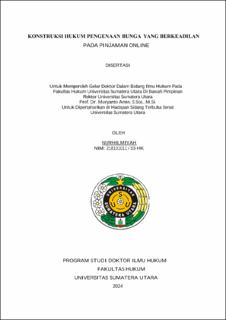| dc.description.abstract | Online loans or peer to peer lending are intended as an alternative for economically weak communities in obtaining access to funding for business capital. In order to help people get out of economic difficulties, various kinds of online loan services offer loans quickly and with minimal requirements as found in banks. This online loan can even be easily accessed with only an ID card and a phone number. Online loans are considered a helper for the community, because they are able to provide funds to meet the productive and consumptive needs of the community on easy terms. It is hoped that the community's economy will experience growth. However, in practice, the implementation of online loans is colored by various kinds of complaints from the public, such as the occurrence of fraud, the behavior of collection officers, the imposition of high interest, the misuse of personal data so that debtors want to commit suicide. This dissertation specifically discusses the imposition of interest by online loan providers who do not have strict regulations in Indonesia, the legal consequences of not regulating the amount of interest in the online loan administration system in Indonesia, and proposes the construction of a fair interest imposition law on online loansin Indonesia. This study uses normative legal research methods with the nature of prescriptive research and several research approaches, namely the legislative approach, conceptual approach, and philosophical approach. This study found that; (1) the indecisiveness of regulations regarding online loan interest in Indonesia is due to the fact that the OJK is still monitoring the growth and development of the online loan industry in Indonesia. (2) The legal consequences of not regulating the amount of online loan interest cause the imposition of extreme interest on online loan debtors , resulting in turbulence in the online loan industry. The community has lost trust in the organizers so that the good goal of supporting alternative funding has not been achieved. (3) The legal construction of fair interest imposition on online loans must be built based on the principles of fairness, usefulness and legal protection. This study recommends; (1) so that the term LPBBTI is included and used explicitly in the P2SK Law. This can show the seriousness and commitment of OJK and stakeholders in dealing with problems related to online loans. (2). Optimizing the cross-sectoral coordination function on a regular basis in order to achieve sectoral policies that are conducive to the development of the financial industry, (3). Pouring the imposition of economic benefits into laws and regulations, it is not enough to just regulate it in a circular. | en_US |


